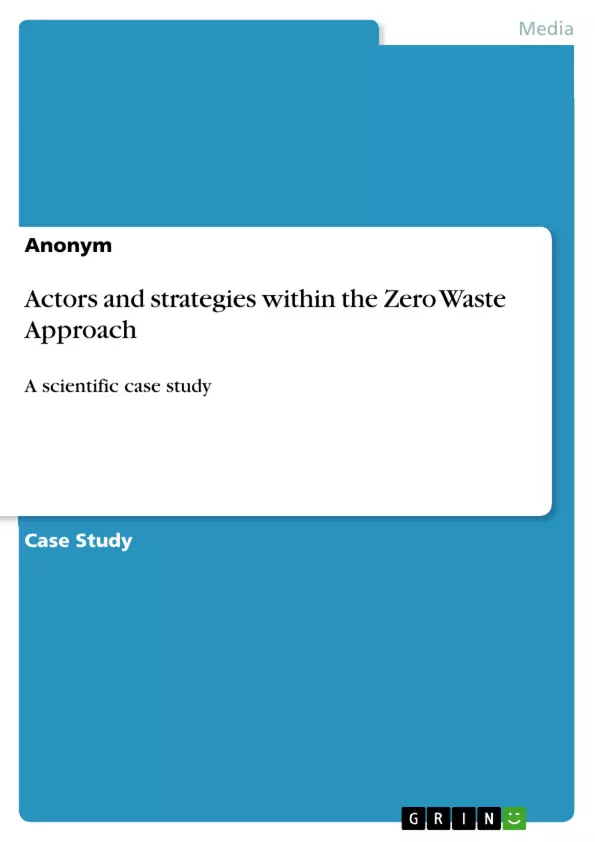A scientific case study in actors and strategies that were used during a referendum of the Zero Waste Approach in Scotland. The main focus is on the political communication of the new rule.
The Zero Waste Plan is an important issue due to its origins in the Climate Change Act (2009) and to the pressure of adapting to stricter EU waste policies. The issue was put on the public agenda in 2007 for the first time and even now in 2011, it is causing a public debate on a national level. The reason for the importance of the Zero Waste Plan lies in its objectives and in its consequences for businesses, industries, public sector and citizens.
Inhaltsverzeichnis (Table of Contents)
- Introduction
- Relevance of the Zero Waste Regulations
- Key actors
- Types of applied strategies
- Conclusion
- Reference list
- Sources list
- Appendix 1
Zielsetzung und Themenschwerpunkte (Objectives and Key Themes)
This case study examines the implementation of the Zero Waste Plan in Scotland, focusing on the actors involved in the debate and their strategies for supporting or opposing the Zero Waste Regulations. It analyzes the government's approach to policy implementation, exploring the perspectives of various stakeholders and their resource dependencies.
- The Zero Waste Plan and its objectives
- Key actors and their roles in the Zero Waste debate
- Strategies employed by different actors to influence policy implementation
- The impact of resource dependencies on the policy network and advocacy coalitions
- The significance of the Zero Waste Regulations within the context of environmental policy
Zusammenfassung der Kapitel (Chapter Summaries)
- Introduction: The Zero Waste Plan is introduced as a significant policy initiative driven by the Climate Change Act and EU waste regulations. The plan aims to shift public perception of waste as a resource and reduce environmental impact through waste prevention, reuse, recycling, and recovery. The chapter highlights the plan's objectives, key measures, and the ongoing dialogue with stakeholders.
- Relevance of the Zero Waste Regulations: This chapter explores the significance of the Zero Waste Regulations in relation to environmental policy frameworks. It examines the policy problem of environmental issues, the influence of international waste management regulations, and the shift from a traditional environmental paradigm to a sustainable development paradigm.
- Key actors: This section identifies the main actors involved in the Zero Waste debate, including government entities, local authorities, businesses, environmental pressure groups, and citizens. It outlines their respective roles, resources, and concerns regarding the regulations.
- Types of applied strategies: This chapter analyzes the strategies employed by different actors based on Compston's theory of tradable resources. It examines the use of media by outsider groups to exert influence and the role of resources, such as expertise, financial capital, and public image, in shaping the policy network and advocacy coalitions.
Schlüsselwörter (Keywords)
Key terms and concepts explored in this study include: Zero Waste Plan, Zero Waste Regulations, environmental policy, resource dependencies, policy network, advocacy coalition framework, sustainable development paradigm, stakeholder engagement, media influence, and policy implementation.
Frequently Asked Questions
What is the "Zero Waste Plan" in Scotland?
It is a policy initiative driven by the EU and the Climate Change Act (2009) that aims to treat waste as a resource rather than a burden.
Who are the key actors in the Zero Waste debate?
Key stakeholders include the Scottish government, local authorities, businesses, environmental pressure groups, and individual citizens.
How does the media influence Zero Waste policy?
Outsider groups often use media strategies to exert public pressure on the government and shape the narrative around waste regulations.
What are "tradable resources" in this context?
The study uses Compston's theory to explain how actors use expertise, financial capital, and public image to influence policy networks.
Why is the Zero Waste approach causing a public debate?
Because its implementation has significant economic and operational consequences for industries and the public sector in Scotland.
- Arbeit zitieren
- Anonym (Autor:in), 2011, Actors and strategies within the Zero Waste Approach, München, GRIN Verlag, https://www.grin.com/document/972377



